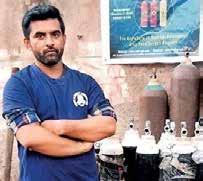E-Dialogues | COVID-19 Challenges & Solutions
Doctors, journalists, academicians discuss Corona crisis & way forward in webinar series Through the month of June, Urban Update organized a total of four webinars as part of its ‘E-Dialogues’ series. Different topics, covering varied angles related to the COVID-19 pandemic, were covered through these webinars with the aim of making the public understand the real problems that the world faces during these tough times
T
he fourth webinar in the Series was titled ‘Virus, Vaccine and Economy’. Covering three of the most relevant points – virus, vaccine and economy, the webinar was aimed at presenting a comprehensible view of the three completely different yet interdependent notions. For this, Urban Update invited Prof Sudipta Sarangi, Head of Department (Economics), Virginia Tech University; Prof Deepankar Basu, Department of Economics, University of Massachusetts; Dr Mathew Varghese, Orthopedist, St Stephen’s Hospital, Delhi; Dr Soutmira Pathare, Director, Centre for Mental Health Law and Policy, Indian Law Society; Rajesh Kumar Jha, Prasar Bharati Special Correspondent, Dhaka and Ashutosh Pandey, Editor and Financial
40 July 2020 | www.urbanupdate.in
Correspondent, DW Network, Germany. The session was moderated by Kumar Dhananjay, Consulting Editor, Urban Update. Dhananjay introduced the theme of the webinar and spoke about how coronavirus has affected economies of the world. He went on to talk about how billions of dollars are being pumped into the economies to revive them and to get them ready to produce the required amounts of vaccines, whenever a vaccine is successfully developed. “Billions of dollars are being spent in research for the development of the vaccine but the question remains – when will the vaccine be ready and how effective will it be?” said Dhananjay. Taking the discussion forward, Prof Soumitra Sarangi began by saying that though the vaccine trials have begun and the results are promising, the virus is here to stay. The real state of affairs around the world will be visible only after lockdown eases, when people are allowed to move out of their houses and resume economic activities, with certain modifications. “Citizen
responsibility plays a vital role in keeping the virus at bay post-lockdown,” Prof Sarangi said. He went on to say that authorities must keep in mind that the effect of prolonged lockdowns will be uneven across different sections of the society, being more pronounced for women and the girl child. Prof Deepankar Basu was invited next to share his views on the topic. He began by saying that governments around the world need to understand that the global health pandemic cannot be stopped without controlling the economic crisis that has accompanied it. “This is even more important for poor, under-developed and developing countries, where the government does not allocate adequate funds for development of healthcare facilities.” He also pointed out that a straightforward solution to this would be the successful development of a coronavirus vaccine, the chances of which rise daily as more and more vaccine candidates move towards successive levels of vaccine trials. He also pointed out that micro, small and medium industries are the worst-hit












